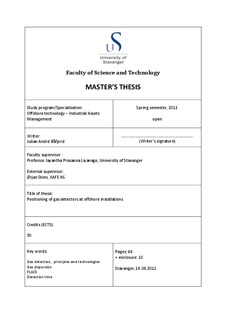| dc.contributor.author | Båfjord, Julian André | |
| dc.date.accessioned | 2011-10-25T15:05:20Z | |
| dc.date.available | 2011-10-25T15:05:20Z | |
| dc.date.issued | 2011 | |
| dc.identifier.uri | http://hdl.handle.net/11250/182835 | |
| dc.description | Master's thesis in Offshore technology | en_US |
| dc.description.abstract | The safety level at offshore installations is considerably influenced by in which degree undesired gas releases are detected. The primary functions of a gas detection system are to detect the presence of gas and inform other safety functions and systems if gas is presented.
Gas detectors are essential components in the gas detection system and their position are important in order for the gas detection system to ensure quick and reliable detection of released gas. The gas detector positions affect the functionality of the gas detection system, meaning the ability to detect released gas and initiate control actions in form of other safety functions and systems. In addition the gas detector positions affect the reliability of the gas detection system, which is the ability of the system to perform its intended functions under different conditions over time.
This thesis studies different factors which must be considered when selecting the best suited positions for gas detectors at offshore installations where production of oil and gas takes place and evaluate their degree of impact on the functionality and reliability of the gas detection system. The different factors’ influence on the risk level related to undesired gas releases are discussed as well.
In addition to a literature review gas dispersion simulations have been carried out using FLACS in order to study how different physical factors such as wind speed, wind direction, leak source, leak direction, leak rate, gas composition and the geometry of a given module influence the behaviour of released gas, which again determine the best suited positions of the gas detectors.
Since fast detection of escaped gas is one of the main requirements with respect to the gas detection system the detection time must be regarded as a critical factor with respect to functionality and reliability of the system. Low detection time allows the initiation of control actions at an early stage and increases the probability of preventing the formation of flammable fuel-air clouds. The ignition probability, the effect of preventive and consequence reducing barriers and the risk related to a leak are highly affected by the detection time.
The combination of different gas detector principles and technologies seems to have a considerable influence with respect to functionality and reliability of a gas detection system since detection methods share few common failures.
Results from the gas dispersion simulations carried out using FLACS indicate a slightly reduction in detection time with an increasing number of monitor points. Plots from simulations carried out in FLACS indicated how the behaviour of escaped gas is influenced by variation in different physical parameters. An inadequate number of simulations were carried out with respect to point out governing parameters in general, but the influence of some parameters was more evident than others. The wind vector seems to have the most evident influence on the escaped gas in the simulations. Especially areas with intermediate and low gas concentrations were influenced by the wind vector.
II
In connection with future studies a considerably higher number of simulations should be carried out with more variation in parameters in order to study the degree of influence different physical factors have with respect to escaped gas in more detail. | en_US |
| dc.language.iso | eng | en_US |
| dc.publisher | University of Stavanger, Norway | en_US |
| dc.relation.ispartofseries | Masteroppgave/UIS-TN-IKM/2011; | |
| dc.subject | offshoreteknologi | en_US |
| dc.subject | driftsledelse | en_US |
| dc.title | Positioning of gas detectors at offshore installations | en_US |
| dc.type | Master thesis | en_US |
| dc.subject.nsi | VDP::Technology: 500::Marine technology: 580 | en_US |
